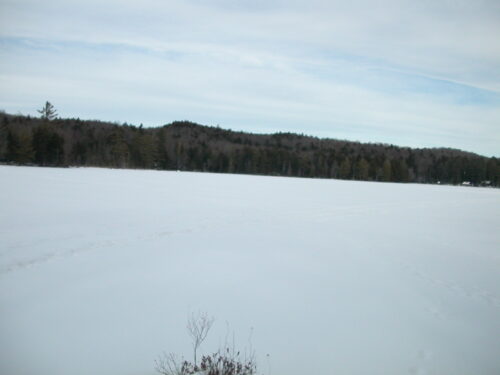
This is a photo of Racket Lake. It’s called that because the snowmobiles make a big racket when they speed over the ice.
Actually that’s not true.
Filters have been applied to this cropped photo to make it wuzzier and more sherbert flavorful. The lake is spelled Raquette, not Racket, and it’s supposedly named for a pile of snowshoes, raquettes in French, found at the confluence of the water. At least this is the origin given by the area’s museum, Adirondack Experience.
Since people in positions of authority are, in 2023, the most likely to be repeating a mistaken belief, I looked up the word and found raquettes to indeed be the word for snowshoes in French. Whether abandoned raquettes were the inspiration for the name is still up for grabs, but the explanation is at least plausible. If I were going to write an authoritative tome on Raquette Lake (sans the final “s,” please note), I would seek historical documents attesting to the longevity of the name and the presence of French-speaking persons in the area at the time the word arose. If a contemporary account of a such a story was extant, I would cite this derivation in my Raquette Lake exposition, perhaps simply as anecdote or with a caveat. In other words, I would employ some conscientious skepticism. The explanation I threw out first about the name is, of course, patently absurd.
Our perceptions of the world are like a cropped photo, limited by where we stand and blurred by our perspective, which is never absolutely sharp. Furthermore, our experience is a lens we place over everything we encounter, lending the landscape a color unique to us.
But a distortion of reality (and we all have them) is not the same as a delusion. When confronted with a piece of information that sharpens the focus or clarifies the color, people usually make the adjustment without difficulty. This is how a subjective understanding that is rooted in objective reality changes and evolves. Experience teaches us that we don’t have a perfect understanding of reality, so we are able to shift our view, just a bit.
A delusional picture of Raquette Lake, on the other hand, might look like this

or this

or even this

Delusions do not accept skepticism or withstand scrutiny. When confronted with evidence that doesn’t fit into a delusion, people tend to defend the delusion. The defensiveness is a clue that there is a wholly false idea imbedded in the consciousness, and people express this defensiveness by censorship. It is especially hard for people to examine a delusion if it benefits them materially or socially. As evidence increases, despite efforts to shut down discussion, some people experience greater and greater distress until the delusion dissolves. Others fall too deeply into the delusion to swim out. I call this racket, where some are deluded, others are too apathetic to know what a delusion is, and others are forced to endure lies, “Racket Lake.”
What’s in a name? as Shakespeare once said, and stoned philosophers repeat often, thinking they’ve said something new. I suppose we could call this Raquette Lake

but it’s kind of stupid, and most people who already have seen Raquette Lake (or even seen a lake) would agree only if they were forced. Language does evolve, though it’s being willfully mutilated at the moment by the gender studies departments and their black-hooded minions. Still, that’s not exactly what I’m talking about here. The con goes even deeper. What I’m saying is that this

is not this

The ice on Racket Lake is rather thin. Mass delusions are dangerous for the apostates and the appeasers and the true believers. You may face consequences from the fearful or the powerful or the powerfully fearful for telling the truth. Then again, you may continue peddling delusions without recognizing that the weather has shifted. Because being forced to play along with delusions has the curious effect of making people value the truth. Falsehoods cannot survive forever for this reason.
People who endured decades of repression in Eastern Europe under Soviet domination maintain that although they suffered from economic stagnation, bureaucratic corruption, and lack of communication with the outside world, the worst part of the experience was playing along with the disinformation: stifling their observations; pretending to believe things they didn’t believe; honoring people they detested. Those who escaped scolded us in the West for not appreciating our freedom.
Now we in the US are being coerced into accepting that men can be lesbians. That castrating children is medical care. That sex stereotypes are carved in granite as “gender” while sex itself is sculpted in ice. That being male or female is “fluid” while your ideas about yourself are your very existence.
Well, the world is heating up. How solid is the ground under your feet (and how deep is the water)? We shall see.

 What happens when your world gets turned upside down and in the confusion of reevaluating all that you thought true, the people you regarded as allies distance themselves or judge you?
What happens when your world gets turned upside down and in the confusion of reevaluating all that you thought true, the people you regarded as allies distance themselves or judge you?